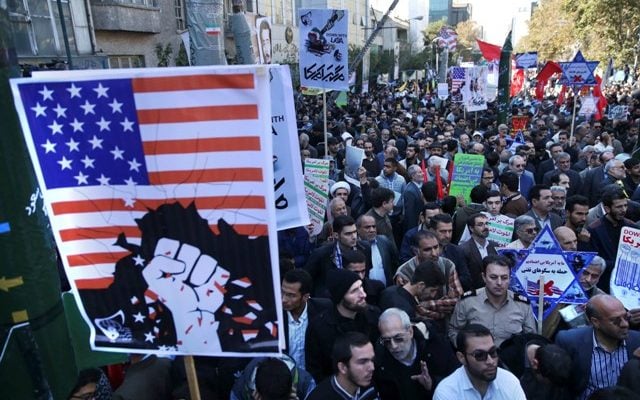Iranian officials often boast about their military technology advancements and call for the destruction of Israel, yet these claims might ring hollow.
Iran’s military is in much worse shape than is commonly believed and is overextended in Syria, meaning that an American or Israeli attack against the Islamic Republic’s nuclear and military sites would not be very difficult to execute, experts told JNS.org.
Since the election of President Donald Trump, there has been evidence the Iranian regime is behaving and speaking more carefully.
The Middle East Media Research Institute (MEMRI) published a report in March that noted Iran had pulled back from provocations against US Navy vessels, and even stopped making public threats to sink these ships in the Persian Gulf.
“The slogan ‘death to America’ has disappeared almost entirely from the official discourse of regime spokesmen, including Iranian Supreme Leader Ali Khamenei himself, as have public burnings of the American flag,” stated the report.
Brigadier General Masoud Jazayeri, deputy chief of staff of Iran’s armed forces, warned the US to be more careful about its warship movements in the Persian Gulf, Fars News Agency reported March 26. Jazayeri’s rhetoric seems softer than past warnings from Iranian leaders.
Claims of Military Prowess ‘Complete Nonsense’
Yigal Carmon, president and founder of MEMRI, told JNS.org Iranian claims of domestic development of military technologies are “complete nonsense.” The only serious concern, he said, is the country’s acquisition of North Korean missiles.
Iran imports North Korean missiles and renames them to give the impression that they were domestically developed, said Carmon. Every few weeks, he explained, Iranian media publish baseless stories about supposed successes of their military programs. In one notable episode in January 2013, Iran’s Space Agency announced it had sent a monkey into space, yet pictures of the monkey before and after the “mission” did not match up.
“Iran does not create any quality military equipment, they only are able to buy from abroad,” said Carmon, adding, “What do they invent to counter US ships? All they are able to come up with is suicide speed boats.”
Carmon also pointed out the Iranians once “displayed what they claimed to be domestically built submarines, but when we saw the picture that they put out, we saw that the size would be good for the Baltimore aquarium.”
No Match for US or Israel
Further, in January, Iran conducted a failed ballistic missile test. Carmon views Iran as no real challenge to the US.
“If the US or Israel attack Iran’s nuclear sites and military targets, it will be a done deal,” he said.
Possibly bolstering this argument is a comparison of American and Iranian financial resources.
“Look at the figures,” Fox News columnist Jonathan Adelman, an international studies professor at the University of Denver, wrote in February. “The American GDP of over $18 trillion is more than 40 times the GDP of Iran ($450 billion)….Given all this, the fear of Iran getting nuclear weapons still remains real. But, even more real is the notion that the biggest power in the world, plus three significant regional powers (Israel, Egypt and Saudi Arabia), could handle Iran if they would put their minds to it.”
All the while, Iran has stretched its resources in recent years by spending $6 billion annually in support of President Bashar al-Assad’s regime in the Syrian Civil War, according to Bloomberg News. Iran did experience some financial relief, however, through a $1.7 billion payment from the Obama administration that many believed represented “ransom” for the release of several American hostages, the Washington Free Beacon reported in March 2016.
Dr. Harold Rhode, a distinguished senior fellow at the Gatestone Institute think tank and a former US Defense Department official, told JNS.org that while America is strong both militarily and internally, Iran and North Korea “appear strong, but are weak and rotten inside.”
‘Unprecedented Crisis of Water Resources’
Rhode pointed out that while Iran is trying to develop nuclear weapons, its government is systematically destroying the country by ignoring domestic problems such as a water crisis. According to a study published in March 2016 by the London-based NGO Small Media, Iran “faces an unprecedented crisis of water resources that threatens to render vast swathes of the country near-uninhabitable within the coming decades.”
Another domestic challenge is Iran’s rampant opium drug problem. Rhode speculated that Iranian authorities could crack down harder on drugs, but refuse in order “to keep the people preoccupied so they don’t concern themselves with overthrowing the government.”
“Do we need to have a massive invasion [of Iran]? No. We must show that this regime cannot do what is necessary to keep themselves in power,” Rhode said, articulating what he believes the American or Israeli approach should be.
MEMRI’s Carmon said there are alternatives to “actual physical attacks,” such as electronic warfare, when it comes to confronting Iran. Rhode, too, said there are many options short of putting troops on the ground—including trying to bring about regime change.
“We live in very stable societies, we expect changes to come slowly, but that is not how it works in totalitarian societies like Iran,” Rhode said, adding, “The moment the people see the regime has lost its ability and willingness to keep itself in power, the regime will topple very quickly, as happened to the shah in 1979. The shah was not willing to do what was necessary to put down the rioting.”
Iran, he said, is “potentially a paper tiger” and it is “our job to encourage regime change—and we can.”
By Ariel Ben Solomon/JNS.org




